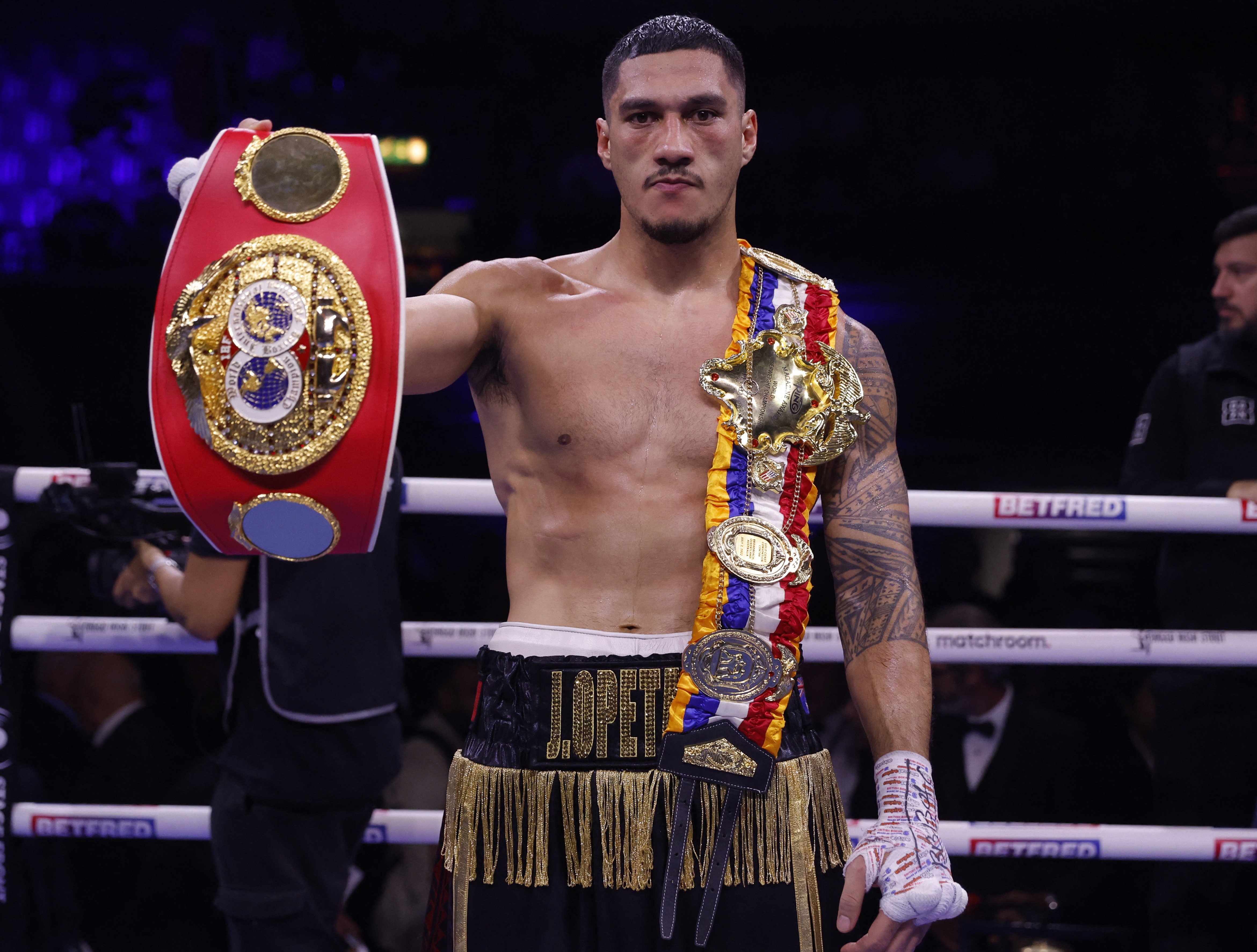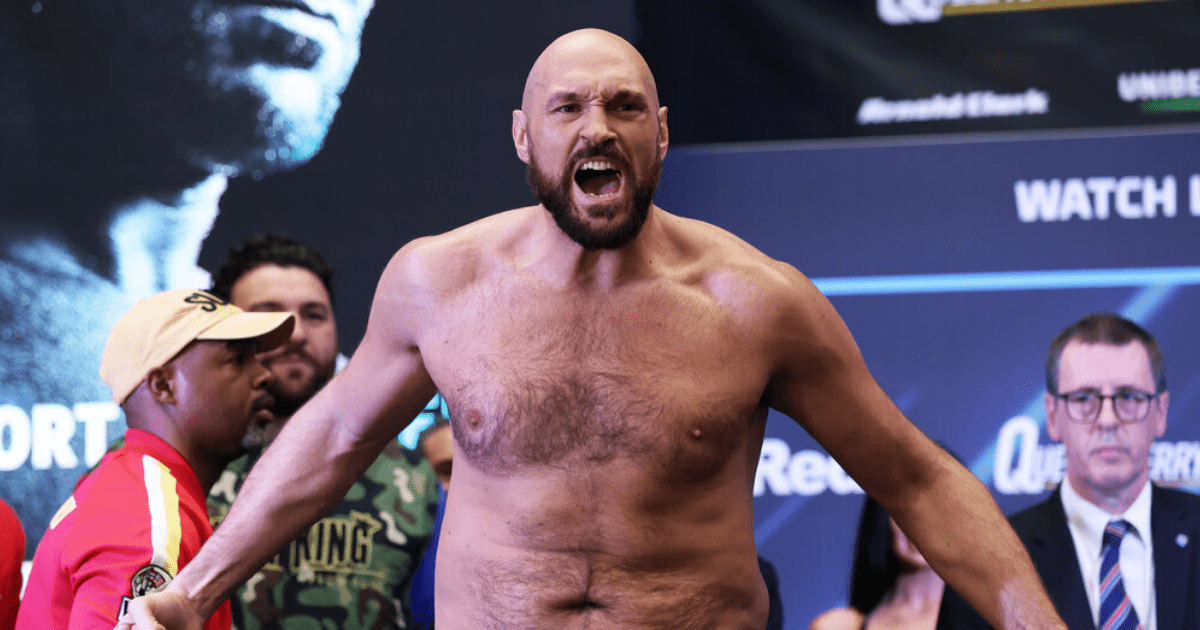Tyson Fury Prepares for Biggest Fight of His Career
Rumors have been circulating that a monster cruiserweight was sent home from Tyson Fury's training camp after just five rounds of sparring. However, these rumors have been quickly denied. The 35-year-old Gypsy King is currently in Saudi Arabia preparing for his upcoming fight with Oleksandr Usyk. Fury aims to become the first undisputed heavyweight champion in over 25 years.
Insight into Fury's Secret Saudi Training Camp
Tyson Fury has provided his supporters with a glimpse into his secret Saudi training camp. The usually outspoken Fury has been relatively silent ahead of the fight, not regularly posting on social media like usual. However, he recently shared a clip of himself and his team training at the gym.
Unbeaten Cruiserweight Jai Opetaia Joins Fury's Camp
Unbeaten 24-0 Australian cruiserweight star Jai Opetaia has been drafted in for sparring in Fury's camp. However, after just five rounds of sparring with the 6ft 9in Fury, Opetaia has returned to Australia to continue his own preparations for his planned Mairis Briedis rematch. This news has sparked wild claims from boxing fans.
Wild Speculation on Social Media
After news broke of Opetaia leaving Fury's camp, speculation ran rampant on social media. Some fans believed Opetaia had dropped Fury in sparring, while others made jokes about Opetaia being sent home. However, there is no evidence to support these claims.

Co-Promoters Deny Dropping Rumors
Opetaia's co-promoters quickly responded to the rumors, stating that the sparring sessions were competitive and that no one was dropped. They emphasized that Opetaia is now back in Australia, finalizing his preparation to defend his world title and looking forward to doing so in Saudi Arabia.
Opetaia's Role in Fury's Camp
It is understood that Opetaia was brought in for sparring because no one in Fury's camp matches the orthodox stance or size of Briedis. Opetaia's similar style and stature made him a suitable sparring partner.
Frequently Asked Questions
How important is mental toughness to professional boxing?
In professional boxing, mental toughness is just as important as physical fitness. The sport requires mental toughness, resilience, and the ability of handling pressure. Mental training involves visualizing, learning stress management skills, and developing the right mindset to take on the challenges inside the ring. Without mental toughness a boxer will struggle to perform under the high pressure conditions of professional competition.
What is the basic training program of a Boxer?
A boxer’s training routine typically consists of several key components. They include technical skill building, tactical drills and strength and conditioning. Sparring and mental training are also included. Tactics drills help develop fighting strategies, while technique-focused exercises improve defensive maneuvers and punch accuracy. Sparring is a great way to gain practical experience. Conditioning exercises improve athleticism. Mental training helps build confidence, focus, resilience and resilience.
How long is it usually required to become a professional fighter?
The time required to become a boxer professional can be very different. It depends on a person’s ability, adaptability, and quality of training. It could take a few years of hard work and success as an amateur before a person is ready to become a professional. Some exceptional talents may progress more quickly than others, but some will need more time.
What kind of diet should a novice boxer follow?
A novice should consume a diet with a balance of nutrients that supports intense workouts, and promotes recovery. The general recommendation is to eat a combination of carbohydrates and proteins for energy. Lean protein helps repair and grow muscles, while healthy fats are good for your overall health. It is also important to consume vitamins and minerals as well. A sports nutritionist will be able to provide a customized diet plan tailored to the boxer’s training regime and weight class goals.
Are there age restrictions for learning to box professionally?
Professional boxing does have age restrictions. Most boxing commissions require boxers to be at least 18 years old to fight professionally. There is no upper limit to the age that a person can safely compete, but there are factors such as physical abilities and health. The fitness of older athletes and the risks involved in taking up professional sports must be carefully assessed before they begin.
How do boxers manage weight and maintain their weight class?
Boxers manage their weight by adhering to strict diets and precise training regimens. Nutritionists will help develop a weight loss plan for boxers that is based on their goals and doesn’t compromise nutrition or training energy. Consistent exercise and regular check-ins on weight are crucial, especially as a fight approaches. Weight management, when done wrong, can lead health issues and poor performance.
What are the roles of managers and promoters in a professional boxer’s career?
Promoters and managers are crucial to a professional boxer’s career. Managers are responsible for guiding the boxer’s career path, negotiating contracts, and handling the business affairs of the boxer. The managers also help the boxer to choose the best fights, and look after his interests. Promoters are more focused on marketing, event organization and attracting sponsorship attention. They also focus on enhancing a boxer’s profile.
Statistics
- Reports suggest that successful professional boxers can earn upwards of 50 times more than the median purse for entry-level professionals per fight.
- The average age for boxers to turn professional is between 18 to 25 years, though many continue to compete well into their 30s and beyond.
- Statistical data indicates that there has been a 15% increase in the number of professional boxing gyms over the last decade.
- Cardiovascular fitness is critical, with a focus on high intensity interval training, comprising up to 40% of a boxer’s conditioning program.
- Research shows that a boxer’s reaction time is typically under 0.25 seconds, honed through repetitive drills and sparring.
- An analysis of boxing injuries suggests that 90% involve the head, neck, and face, emphasizing the importance of protective gear.
- Professional boxers typically train 4 to 6 hours per day, 5 to 6 days a week, depending on their fight schedule.
External Links
precisionstriking.com
proboxing-fans.com
teamusa.org
usaboxing.org
boxingforum24.com
ringtv.com
expertboxing.com
How To
How to Get Your First Professional Boxing Fight
To land your first professional fight in boxing, you need to combine training, networking and marketing yourself. Create a solid amateur record to showcase your skills and attract attention. Network with gym owners, trainers, and promoters who might offer opportunities or know of openings on fight cards. Promote your brand by creating promotional materials, such as highlight reels of your fights. Also, maintain a strong social media presence. Finally, stay ready to fight at all times, so when an opportunity arises, you can take it without hesitation.

